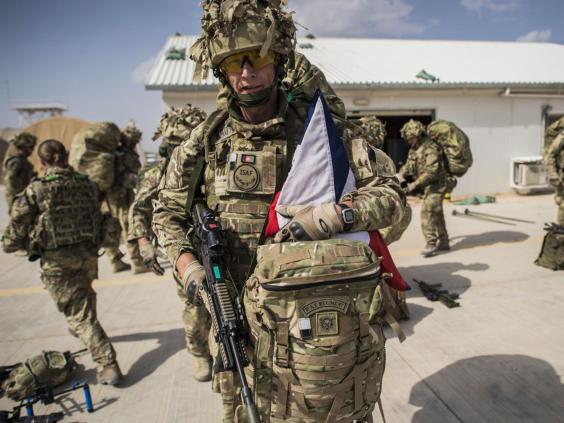
TEHRAN – Iran has once again warned the United States against designating the elite wing of the Iranian army, the Revolutionary Guards, as a terrorist group.
By Own Correspondent
“Whatever they do we will take reciprocal measures. All options are on the table,” Ali Akbar Velayati, senior adviser to Iranian Supreme Leader Ali Khamenei is quoted in a recent Reuters repor citing Isna news agency.
The aide went on to accuse Washington of supporting Islamic State (IS, formerly ISIS\ISIL) terrorists.
Iran’s statements mirror those of the US, with President Donald Trump having recently accused the Islamic Republic of supporting terrorism.
“The Iranian regime supports terrorism and exports violence, bloodshed and chaos across the Middle East. That is why we must put an end to Iran’s continued aggression and nuclear ambitions,” Trump told senior US military officials on October 5.
Reports of the possible designation of the Islamic Revolutionary Guard Corps (IRGC) as a terrorist group, among other measures against Tehran, emerged amid concerns that Trump may refuse to recertify the 2015 nuclear deal.
Following the reports, the IRGC chief warned that it may equate US troops to Islamic State terrorists “if the news is correct about the stupidity of the American government.”
- Chamisa under fire over US$120K donation
- Mavhunga puts DeMbare into Chibuku quarterfinals
- Pension funds bet on Cabora Bassa oilfields
- Councils defy govt fire tender directive
Keep Reading
On Monday, Iran promised a “firm, decisive and crushing” reaction.
A senior Iranian general has called the US president the ‘American twin’ of ISIS leader Abu Bakr al-Baghdadi, responding to rumours that the Trump administration was considering designating the Iranian Revolutionary Guards as terrorists.
Both Trump and Al-Baghdadi display “lack of trust in all principles and regulations of diplomacy and sovereignty in today’s world,” Brigadier General Rasoul Sanayee Rad, deputy commander for political affairs of the Islamic Revolution Guards Corps (IRGC), wrote in an opinion piece quoted by the IRGC outlet Basirat.
One is building a caliphate and the other is invading other countries, the Iranian general argued.
“Using the logic of threat and force in order to advance their objectives, and reliance on their bullying and tyrannical temperament” was another item on Rad’s list.
“One of them is propped up by terrorists, and the other by extremist hawks, and both are being used as instruments to trigger chaos and instability,” the general continued.
Rad also compared Trump’s consideration of designating IRGC as a terrorist organizsation with Baghdadi’s labelling of Iranians as “infidels and disbelievers.”
“Trump’s historic mistake, too, has prompted the IRGC commander to say that he will regard the US as a follower of ISIS in the region if Washington puts the IRGC on its terror list,” Rad said.
The Trump administration has not yet designated the IRGC as a terrorist organisation but it is reportedly considering the move.
“We cannot let a murderous regime continue these destabilizing activities,” Trump told the UN General Assembly in September, citing Tehran’s support for Hezbollah, the Syrian government, as well as for Shia Houthis in the Yemeni civil war.
Meanwhile, the Iranian army vowed it would teach Washington “new lessons” to make it “understand the new meaning of power in the world,” according to the deputy chief of staff of the Iranian armed forces, Brigadier General Massoud Jazayeri.
By October 15, Trump is scheduled to recertify the Iranian nuclear agreement, officially known as the Joint Comprehensive Plan of Action (JCPOA), which limits Iran’s nuclear program for 15 years in exchange for easing the pre-existing sanctions.
The document was signed in 2015 by Iran, the P5+1 group (China, France, Germany, Russia, the UK, and the US) and the European Union. If he decides against recertification, it will go to Congress, which will have to decide whether to re-impose sanctions on Tehran.
Tehran has repeatedly denied any violation of the nuclear agreement and warned against pulling out of the deal. Possible annulment of the nuclear agreement has also caused concerns among other parties to it, with the EU stressing that striking the long-negotiated deal belongs to the international community, not just the US.
America’s Europeans allies have warned Trump that the deal will stand even if he decides to pull out of it.
Possible US moves to decertify the Iranian nuclear agreement is “unjustifiable,” Austria’s envoy to the UN said this week.
UK Prime Minister Theresa May, too, urged Trump in their latest phone call to recertify the nuclear deal with Iran, saying it is “vitally important for regional security.” British Foreign Secretary Boris Johnson called the deal “an historic achievement,” ahead of a meeting with Iranian Vice President Ali Akhbar Salehi in London on Wednesday.











